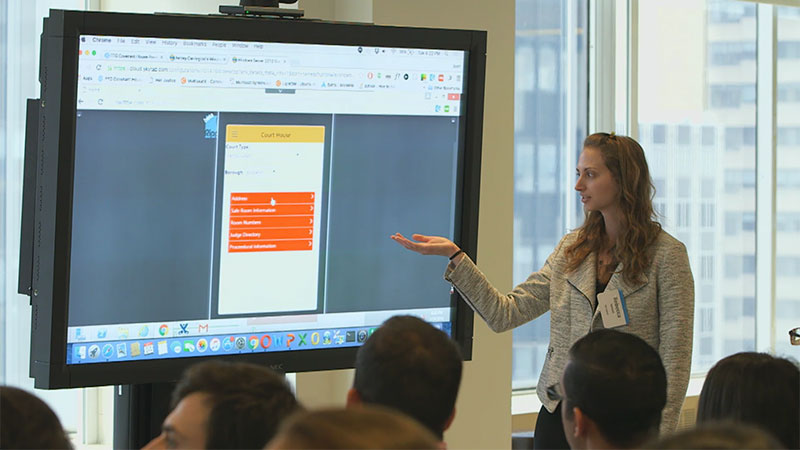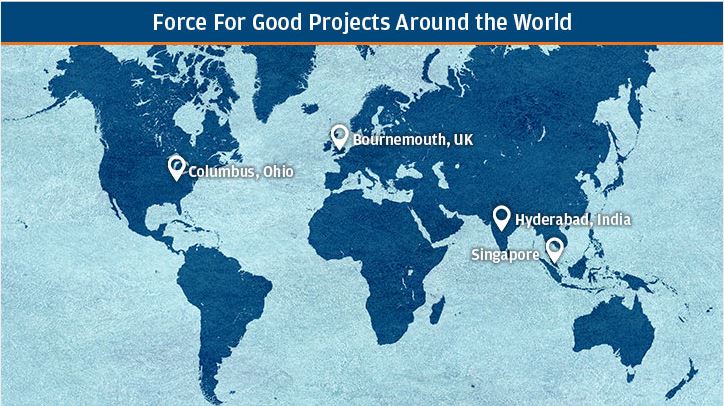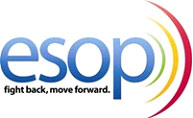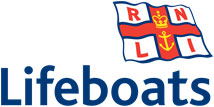Please update your browser.

Stories
Using Tech for Global Good
How our 50,000 technologists around the world partner with nonprofits to give back.
Technology is an incredibly powerful tool. Used well, it can help organizations work smarter and increase access to their products and services. But for too many nonprofits, technology can be a source of frustration or simply out of reach as a result of constraints.
That’s why the firm launched Force for Good in 2012. “Force for Good is an 8–month-long initiative to support nonprofits with technology,” says Ed Boden, Global Lead of Technology for Social Good programs. “We have more than 50,000 technologists at JPMorgan Chase around the world and they’re passionate about giving back. Force for Good gives our employees the opportunity to utilize their unique skills, while also learning new ones, to build technology solutions for the organizations that need it most.”
In the current Force for Good project cycle, the firm’s technologists will support over 100 projects for various nonprofits around the world. Over 1,000 JPMorgan Chase technologists will participate in the program, contributing over 50,000 hours of development time to these socially-focused projects. There are a range of projects in the portfolio, including mobile app development, website development, data analytics and database management. Expand the sections below to explore a few of the Force for Good projects around the world.


Empowering and Strengthening Ohio’s People (ESOP)
Columbus, Ohio
Empowering and Strengthening Ohio’s People (ESOP) is a full service housing and financial counseling agency. ESOP offers a handful of different programs in Ohio including housing counseling, financial coaching, income tax prep, and senior financial empowerment.
“When we started working with ESOP they were serving over 6,000 new clients a year while manually tracking data and program key performance indicators in Excel,” says Kalyn Sprague, Force for Good Tech Architect. “As ESOP continues to expand its services, tracking data manually has become cumbersome, time-consuming, resource intensive, and inefficient. They needed a better way.”
In 2016, ESOP applied to Force for Good in search of a database solution that would better manage their client information and provide real-time metrics about their programs. A team of JPMorgan Chase technology employees dedicated a part of their work week over an 8-month period to help ESOP migrate onto a Customer Relationship Management System (CRM). The CRM platform worked so well ESOP returned for two more cycles with the Force for Good program to onboard their 1-on-1 counseling data and customize reporting and dashboard features.
Over 3 cycles of Force for Good tech volunteers have delivered robust data management capabilities that ultimately change the way ESOP operates. “This solution will have an immeasurable positive impact on our employees, programs, operations, and constituents,” says Michael Billnitzer, Executive Director of ESOP. “The database allows us to better serve our clients by allowing our employees to access client information, real-time performance trends, and robust reporting and dashboards. Our full-time staff can now focus more of their energy on client services and spend less time generating reports.”
The implementation of the new platform is expected to save ESOP over $65,000 each year in productivity hours. “Knowing that our work directly benefits our friends and neighbors is extremely rewarding,” says Kendallene Hill, Force for Good Senior Developer. ESOP and Force for Good plan to partner again in the upcoming program cycle to implement time saving integrations with ESOP’s parent company software, benefits enrollment partners’ APIs, and an SMS texting tool.
To learn more about ESOP, visit www.esop-cleveland.org1.

Royal National Lifeboat Institution (RNLI)
Bournemouth, UK
The Royal National Lifeboat Institution (RNLI) save lives at sea by providing 24-hour lifeboat search and rescue services, seasonal lifeguards, water safety education and initiatives, and flood rescue response. The RNLI is committed to see a reduction in drowning, which claims an estimated 372,000 lives around the world each year. More than 90% of these drownings happen in low- and middle-income countries. Specifically, fishermen from small communities do not have a way to alert people in an emergency. Therefore, the RNLI was keen to explore different technology platforms that could reduce the number of drownings happening in these areas.
“A lot of creative ideas for this project came directly from the students at Code for Good, a 24-hour hackathon also run by the Tech for Social Good team, which the RNLI participated in prior to Force for Good,” says Brandon Scott, Force for Good Technical Architect. “We knew this technology platform would need to be easily accessed in emergency situations and designed to function well in regions with limited WiFi and cellular coverage. We were up for the challenge.”
A team of JPMorgan Chase technologists in Bournemouth worked with the RNLI to develop this solution. The outcome? A working prototype of an Android Application called “Set Sail” that once live, will allow fishermen to quickly access an ‘Alert’ button in emergency situations. When activated, the mobile application will raise an alert and share the GPS coordinates with other users of the application.
“Drowning is a major worldwide issue,” says Libby Rhodes from the RNLI. “Throughout our international work, we’re partnering with organisations to help people stay safe and save lives. We have received great expertise from our partners to understand what people really need. This application will give fishermen a way to alert members of their community in an emergency and help coordinate their rescue, ultimately saving lives. We’re hoping this is just the start – something like this could potentially be scaled to remote fishing communities worldwide.”

Nayi Disha
Hyderabad, India
Nayi Disha aims to support families of Persons with Intellectual Developmental Disabilities (PwIDD). Families and caregivers of PwIDD often struggle to find the right resources and services and Nayi Disha addresses this challenge.
“I was shocked to find lack of information at this age of information technology. Lack of information is so severe that it leads to delayed or missed diagnosis and assessment, and consequently, reduced uptake of essential therapies and services that are vital for the child’s growth,” says Prachi Deo, Founder of Nayi Disha. “We realized there lacked a supportive system that could help families access information that empowers them to provide the best care for their children.”
To help Nayi Disha continue to provide families with valuable information and connect them to providers like schools, therapists, doctors and fellow parents while on the go, the organization asked Force for Good to build a mobile app that would enable families to more easily access their information and resources.
“Today, mobile phones are utilized by everyone. We knew that a mobile app would allow families to access Nayi Disha’s resources anywhere and anytime,” says Neelkamal Pasi, Force for Good Product Owner. “The mobile application developed by our team will not only allow Nayi Disha to reach more families, but also will allow them to onboard parents more effectively, give them access to curated information in a streamlined way, and create a community for families to share and learn from experiences.”
Over the next few years, Nayi Disha hopes to use this app to expand their provider directory to 15 cities and empower 30,000 families by giving them greater access to resources.
To learn more about Nayi Disha, visit www.nayi-disha.org3.

Founded in 2014, SDI Academy provides personalized language, vocational and computer skills training to migrant workers and refugees in Singapore. There are over one million migrant workers in Singapore. Migrant workers have played an important role in Singapore's progress: they've built homes, served in factories and taken care of children.
“Since inception, we’ve delivered over 10,000 hours of training to over 700 migrant workers,” says Manas Punhani of SDI Academy. “Our trainings enable these individuals to obtain higher salaries and secure better jobs. Our English language training has also helped reduce communication gaps on worksites, improving productivity and safety.”
It is challenging for migrant workers to find the time to take the trainings. “They work long hours, six days a week, and often commute more than two hours every day. Migrant workers are only able to sign up for classes on Sundays and they often drop out because they don’t have time to prep and review materials in advance,” says Mohit Handa, Force for Good team lead. “SDI Academy was looking for a mobile learning management system that would allow workers to access training materials on-the-go.”
A team of Force for Good technologists built a low cost, mobile app platform that could be easily customized by SDI Academy. Migrant workers can use the application to access trainings at any time by downloading course content for offline access when internet is not available.
This learning management system will allow migrant workers to up-skill, learn, and test themselves wherever they want, whenever they want. Despite their busy schedules and demanding jobs, SDI Academy is bringing these migrant workers one step closer to higher paying jobs.
To learn more about SDI Academy, visit www.sdi-academy.org 4.
Learn more about our Technology for Social Good program.
See how we code for good cause with our Code For Good program.
Learn more about technology career opportunities at JPMorgan Chase & Co.
